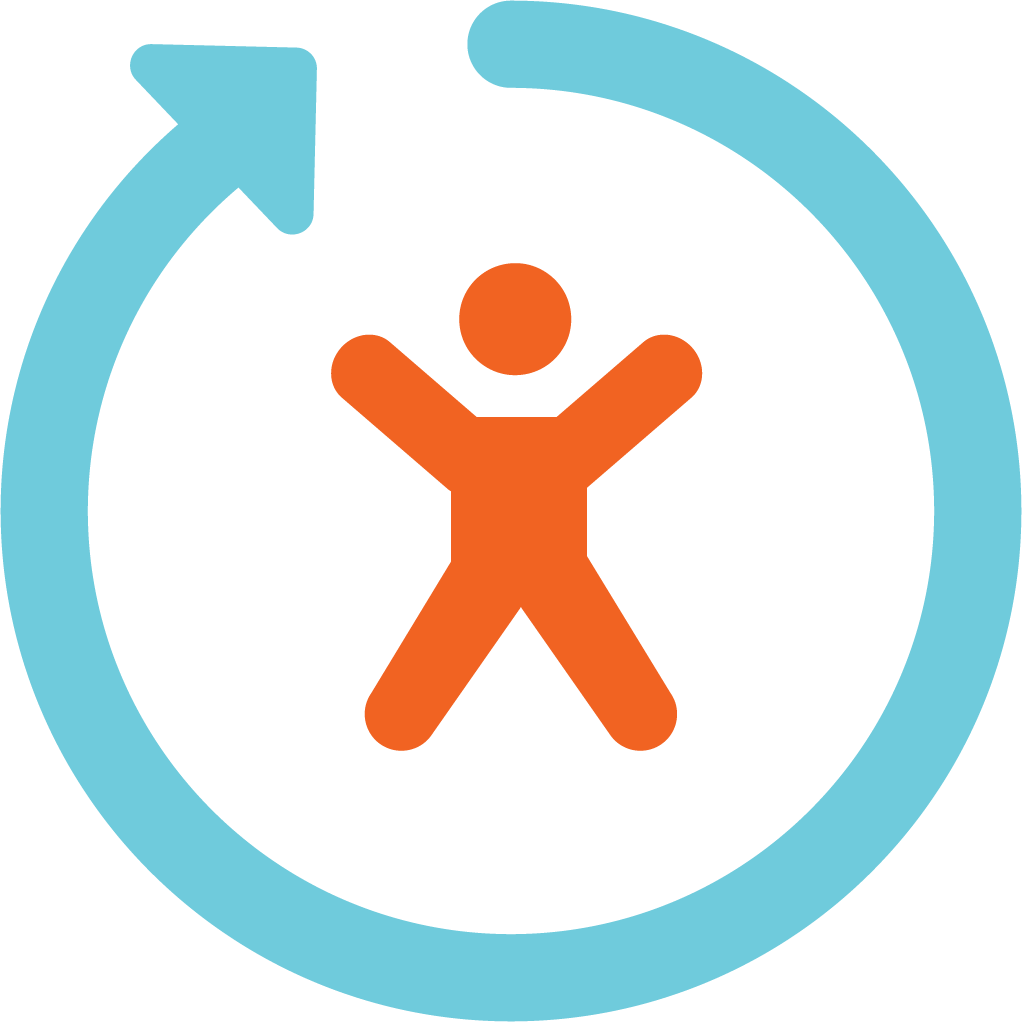In our first section we will finish up our paperwork, get to know your supervisor and dive into information that will be helpful to you working for Accend. Feel free to ask any questions! This is one of the best times to ask as you work closely with your supervisor during orientation.

Our mission is recovery.
The way we pursue that mission is to build partnerships with the people we serve, with each other, and with our colleague and community members to provide responsive, person-centered services that restore health, maximize quality of life, independence, and functioning and lead to improved wellness and recovery.
We are here to support the people we serve, and to support each other, with to goal of propelling each of us forward toward the highest possible quality life.
At Accend, we provide an array of home- and community-based services. Read about those now, or return here to link to the Our Services page on our website at any time.
Together, we welcome you to Accend!
Accend Services underlying treatment philosophy is one of partnership. The client/recipient is the central member of the planning team and the decision-maker in this model. Accend Services staff, including assigned Workers, Practitioners, the Clinical Supervisor and other support team members work in partnership with the client to achieve his or her goals.
The roles and responsibilities of the staff member in this model is to:
Here is brief slide show explaining our services. Tap to begin, then tap on any of the service icons to explore each service in more depth, with links to guide chapters on the service and to the Minnesota Health Care Programs Manual for more information.
Links to webpages about each service will open in new tabs. Close them to return to this slideshow. Tap Back to Overview on any slide to return to the icon menu.
Tap the link below to read the definition of recovery from the Substance Abuse and Mental Health Services Administration, or SAMHSA. Then close the window/tab to return here.
At Accend we have adopted this definition of recovery as our core mission. We understand this mission as one of supporting the whole person, working together with each other and with other providers to build on strengths and resources, and meet needs as a team.
Before you read this section, take a moment to think about your values. Write down three or four words or phrases that describe your workplace values. Then read on.


When we started Accend, something we saw in our communities was that too often people who needed mental health services were put on waiting lists, sometimes months, for an appointment. And even after an initial intake, people with urgent, unmet needs had to endure more waiting, for required and necessary assessments, screenings, and paperwork before they got help with these basic needs.
We wanted to change this.
Our first goal is no waiting lists. We want everyone who contacts us for services to have their first (intake) appointment with us within one week, and receive their first support services on that same day or within 48 hours of the intake appointment.
Your responsibilities in the responsiveness mission are these:
Secondly, while we value high quality assessment and planning as core to effective services, we understand the people who seek out mental health services do so because of current circumstances, urgent needs. We believe that we should get right to work with folks, identifying unmet basic needs and helping them locate and use resources immediately, concurrent with the important assessment and planning work that will help focus services on that person's successful recovery.

Being person-centered begins with applying the core principle of this philosophy: unconditional positive regard. It means, where a person exhibits maladaptive (or undesirable) behavior, isolating that behavior from the person, and understanding that behavior may be a symptom of illness.
Person-centered planning means being strengths-based. It starts with identifying and building on an individual's current strengths and resources, eliciting from them their personal treatment and recovery goals rather than what we believe is best for them, and partnering with them to achieve those goals.
As a practitioner who is person-centered, you understand that your relationship the person you serve is the most important element of treatment success.
Who do you know who supports you unconditionally? Picture that person in your mind, at your worst times and your best. Is this someone you seek out to share your successes? Is this a person to whom you are less afraid to have your failures, mistakes and shortcomings revealed? Do you seek them out for guidance or advice? Is he or she someone who has been a agent of change in your life? Can you be someone like that to each of the people you serve?
You may not be able to be that person for everyone you meet. When you cannot be, you can still be person-centered, by seeking guidance from your clinical supervisor and thoughtfully considering whether someone else can. This is not a failure (unless it happens too frequently), rather a sign of your own self-awareness, professionalism, and commitment to quality.

Are you a person who enjoys meeting people who are very different from you? Do you seek out opportunities to experience different cultures, understand different beliefs, get to know people from different backgrounds from your own?
How would you feel if you were transported, at this moment, to a place on the globe (or sometimes even just across town) where the culture and customs were completely different from your own? (Or, perhaps for you, this is already your daily experience, because you have already been transported to this new culture, as an immigrant, a member of a minority group, or just a new employee in a new organization with very different culture from your past work experiences.)
Does being transported to a new place and culture sound like an exciting adventure and learning experience? Or does it sound frightening, and outside of your comfort zone? Neither answer is wrong. But, you may find yourself at times expected to be an adventurer in your job at Accend.
But, if experiencing a new culture would put you outside your comfort zone, what if you had a guide? Someone who understood the culture into which you had been transported? Someone who would answer your questions and explain your experiences. Would that feel better? Or, would you enjoy meeting just one person whose culture and background is very different from your own?
Each time you meet someone different from you, can you perceive them as a guide? Someone from whom you can learn and grow in wisdom and experience?
When we say our value is appreciation for diversity, it is this that we mean. That each person we meet is a guide to new understanding, to growth, and to a new and rich experience. Can you see each person you serve, who may be very different from you as your guide? Are you willing to learn from him or her? If you can and are, you share our value of appreciation for diversity.
At Accend, we value diversity in both the people we serve, and in our staff who serve them. Do you?

At Accend, partnership is a value that applies to our work with the people we serve, our work with each other, and our relationships with our colleagues and community partners. If our mission is recovery and our goal is the highest possible quality of life for everyone, staff and persons served, partnership is how we will achieve both.
In our work with the people we serve, partnership is an extension of the value of being person-centered. It is not our goals, but the goals of the people we serve that we are working toward, in partnership with them.
In our support and supervision to you, we cherish the same value. What are your goals? Personally? Professionally? How can we help you achieve them? What are your strengths and resources? Where do you need support?

Look at the definition of the word stewardship, here.
For us, stewardship means using the health care dollars of each person we serve as effectively and efficiently as we can, avoiding waste and abuse, providing only medically necessary services that are rehabilitative, directed toward recovery, improved health and quality of life.
As a provider for whom the health care of a significant majority of the people we serve is funded public programs, we also understand our role in stewardship of taxpayer dollars. In the big picture, when we are successful in our recovery rehabilitation mission, and the health of the people we serve improves, overall health care costs go down.
You also have a individual responsibility for stewardship, and many opportunities to be a good steward, while contributing to our mission. Here are some examples:
These are just a few examples of good stewardship as a member of the team. What others can you think of?

Accountability at Accend is nearly synonymous with ethics, and should not be wrongly misconstrued as synonymous with blame. At Accend we believe in accountability at all levels. This means that each of us, regardless of position, is accountable to each and every other person in our agency. We owe each person we serve and each of our coworkers our best, and must strive to provide it.

Heraclitus, the ancient Greek philosopher is quoted (or paraphrased) as saying, "the only constant is change."
How comfortable are you with change? Is it exciting, inspirational, refreshing and welcome? Or is it difficult, challenging, or a hassle?
Regardless of your answer, change is inevitable at Accend. We are a growing and changing and learning organization. While we value stability, we are also committed to growth and change. This is because we are committed to Continuous Quality Improvement. At all times, we examine our policies and procedures, our operating practices and protocols, our supports and supervision, and our techniques and methods in service delivery.
Add to that, we work in a field that is in a constant state of change. Regulations, rules and requirements change in the mental health field constantly, sometimes without notice, and sometimes with requirements to immediately change our operating principles and practices with very little or no prior notification.
Henceforth, you will often feel that you are the beneficiary, or the victim of change, depending on your perspective. As Viktor Frankl once said, "Between stimulus and response there is a space. In that space is our power to choose our response. In our response lie our growth and our freedom." How you choose to respond to change will determine the outcome, and your perception of change and, along with it, your success and job satisfaction.

This venture is a partnership. While you partner with your clients to improve their health, functioning, and quality of life, and we partner with you to support you in this effort. Keep this partnership in mind at all times.
When we founded Accend in 2006, we started with a set of ideas about management that were instinctive to us, but that we struggled to articulate. Not long after, we discovered a book that perfectly articulated them for us. It was Jim Collins' 2001 Good to Great.
What follows are six core principles we took from that book and that we strive to achieve. They are metaphors that represent how we manage and make decisions.
While we have adopted these principles as articulations of our own values, we give full credit to Mr. Collins for identifying them. There are some links to key concepts included below, but you can explore the concepts of Good to Great at Mr. Collins' website, here.

Collins says “If we get the right people on the bus, the right people in the right seats... then we’ll figure out how to take it someplace great.” We use this metaphor not just in seeking the best employees, but in managing them.
We hired you because we think you're the right person for the bus. But are you in the right seat? What are your strengths? What do you have to offer? How can we make a career plan with you that capitalizes on your strengths and gets you doing the job that you do best?

Collins uses the metaphor of the hedgehog challenge us to find out what we can be the best at and then focusing our efforts on doing just that. We use this principle to make our decisions about what we do: what we start doing, what we stop doing, and what we keep doing.
Do you have your own Hedgehog Concept? Do you know what you do best? We're interested in learning about this. As with the bus metaphor above, our goal in supporting you in your career development will be to find your Hedgehog Concept, how it matches with ours, and helping you pursue it.

Collins uses the metaphor of an airline pilot to articulate what he calls “a culture of discipline.” Airline pilots, responsible for the lives of their passengers, must follow strict guidelines to keep them safe, but ultimately are responsible to make disciplined and autonomous decisions.
He calls this a culture of “freedom and responsibility within the framework of a highly developed system.” At Accend, we strive to create a workplace culture that is characterized by this principle of disciplined people.
We will ask you to adhere to strict ethical guidelines, policies and procedures in your work, while at the same time adapting your style and service delivery in the way you see best to meet the needs of the people you serve. Both sides of this equation are important.

This important concept is described by Mr. Collins thusly: “look out the window to apportion credit... when things go well... look in the mirror to apportion responsibility... when things go poorly.” We do this and we challenge everyone, all leaders and management to do the same. As a part of our value of accountability, we will always look in the mirror first when problems occur. Have we done our part? Have we made expectations clear? Have we provided the necessary supports and resources to everyone to meet the expectations and achieve the goals?
This is our promise to you. We will partner with you equally, and share responsibility for success. You, and your coworkers before you, are due the credit for our success. We will always look in the mirror first when solving a problem when things go poorly. We will challenge you to so the same.

The concept of confronting the brutal facts can in part be represented by the metaphor of the Red Flag. While there is much more to this concept in Mr. Collins' book, we use the red flag as a symbol that we must always listen, challenge our thinking, and reward the messengers who raise red flags to tell us something is wrong.
Our promise to you: we will listen. What we ask of you: participate, and propose solutions with the problems you identify.

The flywheel is a metaphor for how we will achieve success. Not with grand ideas that solve problems overnight, but with disciplined effort and hard work over time. You might also consider this metaphor in your work with the people you serve. Recovery is not an overnight success. It is a result of sustained and disciplined effort and partnership with the people you serve.
Change is inevitable at Accend, but we make changes with the mission in mind. When we make a change, we do not expect overnight success. From you, we need partnership: understand why we're making changes (and if you don't, ask), embrace them, and work with us to implement them.

Watch this video from The Conscious Leadership Group before proceeding.
Are you above or below the line? What work and life experiences have you had that have put you where you are now? If you are below the line (we all are at some point) can you operate above the line?
When you see a problem that may or may not affect you, which of the following are you more likely to do?
When you make a mistake, what are you more likely to do?
Finally, when you receive constructive criticism or feedback that you feel is unfair, what are you more likely to do?
We're hoping you see the pattern here. The third options above are the above the line responses. If you would choose these, you're demonstrating Window and Mirror leadership. This is what you can expect from us, and how we hope you'll learn to partner with us to solve problems.

Here, you will find another video from The Conscious Leadership Group. Watch the video before continuing.
Accend is organized in Integrated Teams. In this model, when individuals receive more than one service, we try to assign providers from the same team. At times, however, when is what is best for a particular individual is a provider for at least one service from another team, we make the person-centered decision in assigning them.
In any case, you work with a team of people dedicated to the mission of providing the best possible services we can to the people we serve.
While the video describes responsibility in an operating room, it is very relevant to our model. There are many people who must work together to assure high quality care and responsive services. To put the video on context, here are a few examples of problems we sometimes encounter and how you can accept 100% responsiblity for each:

A common phenomenon we've often observed are rules, policies and procedures that crop up. People are dutifully following these rules, but they don't really exist, or are wrong.
What do we mean by this?
New employees come to us from other agencies where they learned a set of rules for practice. They assume the same rules apply here. They tell you these rules. You assume they must know, since they've been here longer than you.
But these are not our rules.
How can you avoid this? Here are some strategies:
> Use this guide. If you can't find the answer here, send us feedback.
> If something you hear does not sound right, ask your supervisor.
> If what you learn is different from what you heard from coworkers, get back to them about it.
Teamwork requires good communication. These are a few of our expectations for the basic mechanics of good communication:
We've said alot here. Do you believe us? Do your values align with what you have read here? What might we say in summary to wrap this all up?
Perhaps this: this mission and philosophy, these values, these principles are something we take seriously. They define us as an organization. We are a mission-driven and values-based organization. We make decisions based on what drives our mission forward, based in our values.
Many of the principles here are part of the language of our culture. Sometimes we succeed, at other times we fail. But we keep trying. We don't market our services, referrals come to us by word of mouth. We continue to grow, beyond our expectations, because we are asked to help where we can and, if the request matches our Hedgehog Concept (what we think we can do best) we say "Yes!"
What about you? What are your values? Do they align with ours? Does our mission inspire you? Reflect the reasons you entered the mental health field?
These are questions we will explore with you as we support you in your own career plan development. We will also ask you to challenge us in our processes and decision-making, when you feel that any particular process, policy, procedure, or decision is a barrier to accomplishing our mission.
This guide is a living document. We want to improve it with your help. Do you have questions? Found a typo? Find yourself wanting more information? Please send us your thoughts about anything in this chapter by tapping on the link below.